RIO DE JANEIRO — Brazil’s far-right president Jair Bolsonaro held a slight lead over former president Luiz Inácio Lula da Silva with 52% of the votes counted Sunday in a highly polarized election that could determine if the country returns a leftist to the helm of the world’s fourth-largest democracy or keeps its strongman incumbent in office for another four years.
Bolsonaro was given 46.3% support compared to 44.9% for da Silva of the leftist Workers’ Party. Six other candidates share the remaining votes in the election.
It isn’t yet clear if either of the two candidates will be able to claim an outright victory. A possible runoff is scheduled for October 30.
Recent opinion polls had given da Silva a commanding lead — the last Datafolha survey published Saturday found a 50% to 36% advantage for da Silva among those who intended to vote. It interviewed 12,800 people, with a margin of error of two percentage points. Bolsonaro, meanwhile, had repeatedly questioned the reliability not just of opinion polls, but also of Brazil’s electronic voting machines, leading to fears he could attempt to reject the results.
At one point, Bolsonaro claimed to possess evidence of fraud, but never presented any, even after the electoral authority set a deadline to do so. He said as recently as Sept. 18 that if he doesn’t win in the first round, something must be “abnormal.”
Get The Times of Israel's Daily Edition by email and never miss our top stories
Polls closed at 5 p.m. (11 p.m. IDT) nationwide and because the vote is conducted electronically, initial results were out quickly. Final results were expected over the next several hours.
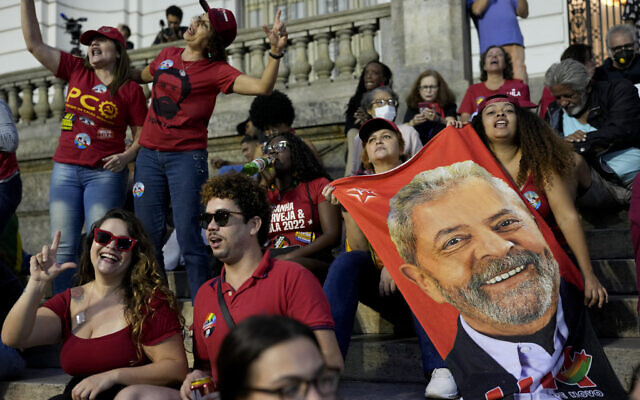
Followers of former Brazilian President Luiz Inacio “Lula” da Silva, who is again running for president, react to the partial results after general election polls closed in Sao Paulo, Brazil, Sunday, Oct. 2, 2022. (AP/Matias Delacroix)
More than 150 million Brazilians were eligible to vote, though abstention rates can reach as high as 20%.
Fernanda Reznik, a 48-year-old health worker, wore a red T-shirt — a color associated with da Silva’s Workers’ Party — to vote in Rio de Janeiro’s Copacabana neighborhood, where pro-Bolsonaro demonstrators often congregate, and had been waiting in line for 40 minutes.
“I’ll wait three hours if I have to!” said Reznik, who no longer bothers talking politics with neighbors who favor Bolsonaro. “This year the election is more important, because we already went through four years of Bolsonaro and today we can make a difference and give this country another direction.”
Bolsonaro’s administration has been marked by incendiary speech, his testing of democratic institutions, his widely criticized handling of the COVID-19 pandemic and the worst deforestation in the Amazon rainforest in 15 years.
But he has built a devoted base by defending conservative values, rebuffing political correctness and presenting himself as protecting the nation from leftist policies that he says infringe on personal liberties and produce economic turmoil.
Marley Melo, a 53-year-old trader in capital Brasilia, sported the yellow of the Brazilian flag, which Bolsonaro and his supporters have coopted for demonstrations. Melo said he is once again voting for Bolsonaro, who met his expectations, and he doesn’t believe the surveys that show him trailing.
“Polls can be manipulated. They all belong to companies with interests,” he said.
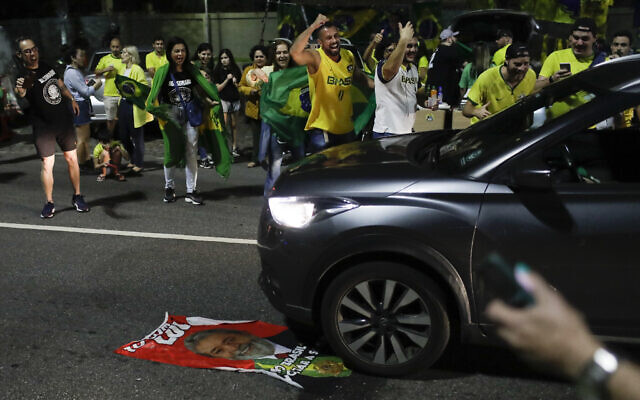
A car drives over a banner of former Brazilian President Luiz Inacio Lula da Silva, who is running for president again, as followers of Brazilian President Jair Bolsonaro cheer him after general election polls closed in Rio de Janeiro, Brazil, Sunday, Oct. 2, 2022. (AP/Bruna Prado)
A slow economic recovery has yet to reach the poor, with 33 million Brazilians going hungry despite higher welfare payments. Like several of its Latin American neighbors coping with high inflation and a vast number of people excluded from formal employment, Brazil is considering a shift to the political left.
Da Silva, 76, was once a metalworker who rose from poverty to the presidency and is credited with building an extensive social welfare program during his 2003-2010 tenure that helped lift tens of millions into the middle class.
But he is also remembered for his administration’s involvement in vast corruption scandals that entangled politicians and business executives.
Da Silva’s own convictions for corruption and money laundering led to 19 months imprisonment, sidelining him from the 2018 presidential race that polls indicated he had been leading against Bolsonaro. The Supreme Court later annulled da Silva’s convictions on grounds that the judge was biased and colluded with prosecutors.
Social worker Nadja Oliveira, 59, said she voted for da Silva and even attended his rallies, but since 2018 votes for Bolsonaro.
“Unfortunately the Workers’ Party disappointed us. It promised to be different,” she said in Brasilia.
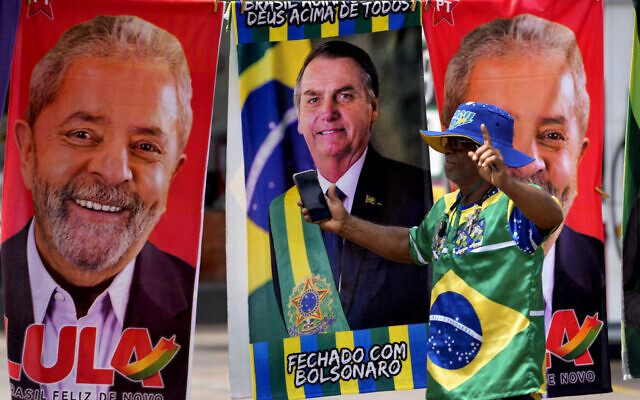
A demonstrator dressed in the colors of the Brazilian flag performs in front of a street vendor’s towels for sale featuring Brazilian presidential candidates, current President Jair Bolsonaro, center, and former President Luiz Inacio Lula da Silva, in Brasilia, Brazil, September 27, 2022. (Eraldo Peres/AP)
Others, like Marialva Pereira, are more forgiving. She said she would vote for the former president for the first time since 2002.
“I didn’t like the scandals in his first administration, never voted for the Workers’ Party again. Now I will, because I think he was unjustly jailed and because Bolsonaro is such a bad president that it makes everyone else look better,” said Pereira, 47.
Speaking after casting his ballot in Sao Bernardo do Campo, the manufacturing hub in Sao Paulo state where he was a union leader, da Silva recalled that four years ago he was imprisoned and unable to vote.
“I want to try to make the country return to normality, try to make this country again take care of its people,” he told reporters.
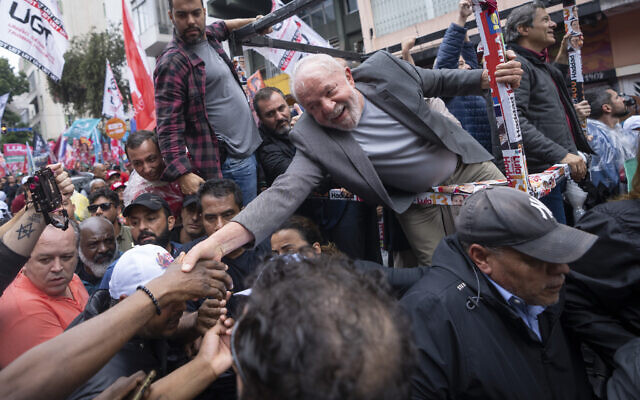
Brazil’s former President Luiz Inacio Lula da Silva, who is running for president, shakes hands with a supporter as he campaigns a day ahead of the country’s general election, in Sao Paulo, Brazil, October 1, 2022. (Victor R. Caivano/AP)
Bolsonaro grew up in a lower-middle-class family before joining the army. He turned to politics after being forced out of the military for openly pushing to raise servicemen’s pay. During his seven terms as a fringe lawmaker in Congress’ lower house, he regularly expressed nostalgia for the country’s two-decade military dictatorship.
His overtures to the armed forces have raised concern that his possible rejection of election results could be backed by top brass.
On Saturday, Bolsonaro shared social media posts by right-leaning foreign politicians, including former US President Donald Trump, who called on Brazilians to vote for him.
Israel’s former Prime Minister Benjamin Netanyahu expressed gratitude for stronger bilateral relations and Hungarian Prime Minister Viktor Orbán also praised him.
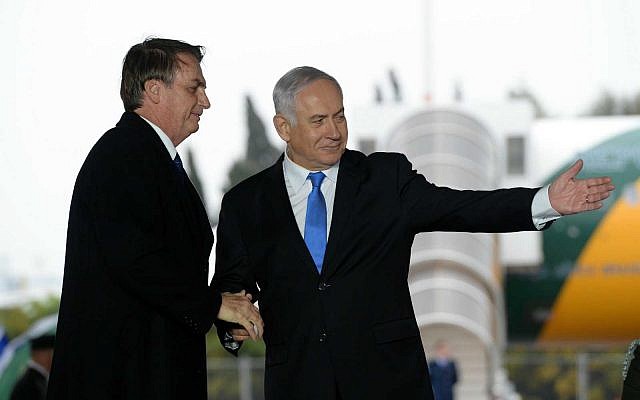
Prime Minister Benjamin Netanyahu greets visiting Brazilian President Jair Bolsonaro after his arrival in Israel, March 31, 2019 (Haim Tzach/GPO)
After voting Sunday morning, Bolsonaro told journalists that “clean elections must be respected” and that the first round would be decisive. Asked if he would respect results, he gave a thumbs up and walked away.
Leda Wasem, 68, had no doubt Bolsonaro will not just be reelected, but win outright in the first round. Wearing a jersey of the national soccer squad at a polling place in downtown Curitiba, the real estate agent said an eventual da Silva victory could have only one explanation: fraud.
“I wouldn’t believe it. Where I work, where I go every day, I don’t see a single person who supports Lula,” she said.


